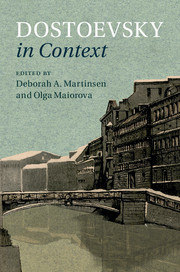Book contents
- Frontmatter
- Contents
- List of illustrations
- Notes on contributors
- Acknowledgments
- Note on citation, transliteration, glossary, and dates
- Chronology
- 1 Introduction: the many worlds of Dostoevsky
- PART I SOCIAL, HISTORICAL, AND CULTURAL CONTEXTS
- i CHANGING POLITICAL, ECONOMIC, AND SOCIAL LANDSCAPE
- ii POLITICAL, SOCIAL, AND CULTURAL INSTITUTIONS
- iii SPACE AND PLACE
- iv RELIGION AND MODERNITY
- 21 Orthodox spirituality
- 22 Religious dissent
- 23 Roman Catholicism
- 24 Islam
- PART II LITERATURE, JOURNALISM, AND LANGUAGES
- Glossary
- Further reading
- Index
- References
22 - Religious dissent
from iv - RELIGION AND MODERNITY
Published online by Cambridge University Press: 18 December 2015
- Frontmatter
- Contents
- List of illustrations
- Notes on contributors
- Acknowledgments
- Note on citation, transliteration, glossary, and dates
- Chronology
- 1 Introduction: the many worlds of Dostoevsky
- PART I SOCIAL, HISTORICAL, AND CULTURAL CONTEXTS
- i CHANGING POLITICAL, ECONOMIC, AND SOCIAL LANDSCAPE
- ii POLITICAL, SOCIAL, AND CULTURAL INSTITUTIONS
- iii SPACE AND PLACE
- iv RELIGION AND MODERNITY
- 21 Orthodox spirituality
- 22 Religious dissent
- 23 Roman Catholicism
- 24 Islam
- PART II LITERATURE, JOURNALISM, AND LANGUAGES
- Glossary
- Further reading
- Index
- References
Summary
Orthodox faith in imperial Russia served as a marker of Russian identity. As Stavrogin once said to Shatov in Demons (1871–2), “If one is not Orthodox, one cannot be Russian” (10:197; Pt. 2, Ch. 1.7). Similarly, both church and state maintained that being Orthodox in Russia meant conforming to the practices of the Russian Orthodox Church. Yet the spectrum of religious belief among Russians was far too broad to sustain this claim. Believers included millions of dissenters and sectarians who deviated from the church over a variety of theological claims or ritual differences. Their presence thus raised the question of Russian religious belief and its relationship with institutional Orthodoxy.
Like other educated Russians of his time, Dostoevsky was fascinated with religious dissenters. Like many, he believed they had deep roots in the Russian people (narod*). In his 1876 monojournal Diary of a Writer, he lamented his own class's “ignorance of our own people, our rupture with nationality […] our weak […] understanding of Orthodoxy” (22:99; WD 1:420). In both his journalism and fiction, Dostoevsky offered an original contribution to the discourse about religious dissent.
The Church Schism (Raskol) in 1656–66 was one of the most important events in Russian history leading to profound religious opposition. The Schism began when the leader of the Russian Orthodox Church, Patriarch Nikon, launched liturgical reforms in the church and ruthlessly suppressed opposition to them. Although many of Nikon's reforms affected ritual and linguistic aspects of the church service rather than church doctrine, the fact that they derived from contemporary Greek and Ukrainian practices rather than from the ancient Byzantine standards in use among the Old Believers, combined with their forceful imposition by the authorities, provoked massive resistance. The Church Council of 1666–7, which included representatives of other Orthodox churches, supported the reforms and anathemized the old rites and their adherents. Tsar Alexei Mikhailovich (1645–76) supported Nikon and deployed troops against the reforms’ opponents, among whom were priests, monks, peasants, Cossacks, merchants, and a small number of noble men and women. Neither church nor state acknowledged the terms Old Ritualists (staroobriadtsy) or Old Believers (starovery) that the dissenters used to identify themselves, but called them schismatics (raskol'niki) or “so-called Old Ritualists.” Repression led to widespread pessimism, apocalyptic thinking, and opposition to both church and state. Many dissenters were severely punished; even more burned themselves alive in anticipation of Doomsday.
- Type
- Chapter
- Information
- Dostoevsky in Context , pp. 194 - 201Publisher: Cambridge University PressPrint publication year: 2016
References
- 1
- Cited by



